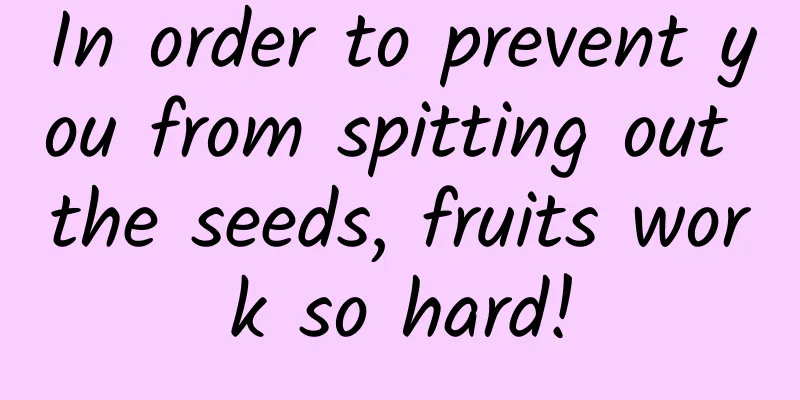In order to prevent you from spitting out the seeds, fruits work so hard!

|
Summer is the season for eating fruits. I believe everyone has this experience when eating fruits. The fresh and tender flesh of the fruit makes us eat very smoothly, but when it comes to excretion, the seeds that we didn't pay attention to when eating have been excreted by you, and the grains are full and intact. Especially when eating fruits like dragon fruit, you will find that we still unconsciously play the role of seed spreaders in the fruit like our ancestors. In fact, there is no shame in this. Some people believe that prehistoric humans discovered that fruit seeds can germinate and grow in our excrement, which gave them the inspiration to domesticate fruit. Plants also hope that their seeds can be spread through animal feces and take root and sprout in a wider area. In order to achieve their goals, plants can be said to have "wracked their brains." Who isn't a primate who loves to eat fruit? Image source: https://www.futurity.org/primates-brains-diet-1387552-2/ Part 1 The true purpose of fruit is hidden in your poop So why do plants prefer to spread their seeds through feces? First, the digestive stay in the animal's body allows the seeds to be spread by the animal in a latent manner, away from their mother plant, avoiding the strong competitive pressure caused by all falling in the same place. At the same time, the seeds excreted with feces also have good germination conditions. The water and undigested nutrients in the feces will provide the initial strength for the germination of the seeds. Another benefit of germinating with feces that you may not have thought of is that hiding in feces can help the seeds avoid predation after they are spread. After all, who would go to dig treasure in a pile of shit? Of course, when we eat fruit, we still spit out some of the seeds. This is partly because domestication has caused the flesh and seeds to swell together, making the seeds hidden inside nowhere to hide. Partly because the intended dispersers of some of the fruits we domesticated are not primates at all, but some larger animals. For them, fruits of this size do not need to spit out seeds. For example, the original seed dispersers of apples should be extinct giant animals larger than humans. They do not spit out the cores like we do when we eat apples. However, with the extinction of these large animals, if there are no humans eating them now, their fruits will basically rot around the mother plant due to the lack of dispersers. Apples rotting around in the wild after ripening Image source: Reference [2] Moreover, the purpose of plant evolution of flesh is to allow the seeds wrapped in the flesh to be excreted intact through the animal's body. Regardless of where the flesh of the fruit we eat comes from in the plant's development process, flesh has evolved countless times in seed plants, basically to attract animals to eat it, and after digestion in their bodies, the seeds wrapped in it (endozoochory) can be dispersed over long distances. In order to allow the seeds to sneak out when animals eat the flesh, the flesh has evolved various subtle adaptive characteristics to complete the dispersal of its own seeds. The process of dispersal of wild fruits of tomato relatives, from being ingested by turtles (a) to being excreted (e) to growing seedlings Image source: Reference [1] Part 2 The first step is to prevent you from spitting out the seeds The pulp is a "bait" to attract animals to spread the seeds, but if the animals eat the pulp and discard the seeds, it will undoubtedly go against the purpose of plants evolving pulp. In order to prevent animals from buying the box and returning the pearl, plants have various strategies to package the pulp and seeds for sale, making them inseparable. Many of the fruit seeds are embedded in the flesh Image source: https://natashaskitchen.com/fruit-salad-recipe-with-orange-poppy-seed-syrup/ In order to prevent animals from spitting out seeds, many plants pack many small seeds in the flesh, dragon fruit and tomatoes are representative examples. Countless tiny seeds are wrapped in the flesh, and when animals eat the flesh, every bite of the flesh they eat contains their seeds. In the mouth, if an animal chews too much, the seeds are likely to die along with the flesh. Many plant fruits have evolved different strategies to remind animals not to chew seeds. For example, there are bitter toxins in the seeds. When the seeds are damaged, the animal's mouth will feel bitter, preventing the animal from chewing too much. When we eat fruit and accidentally bite the seeds, we also find that the fruit in our mouth suddenly becomes less sweet. For example, the red flesh of bitter melon is sweet, but the seeds are very bitter. Image source: DHGate.com Of course, the seeds contained in the pulp have more than one trick to prevent them from dying in the mouths of animals. When eating fruits, we may also have this experience. Some fruit seeds are very slippery, such as tomatoes, dragon fruits and passion fruits. Even if we deliberately bite their seeds, they will slip between our lips and teeth. If you observe carefully, you will find that this is because their seeds are covered with a layer of mucus, which allows them to slip through the gaps between teeth when teeth open and close. Passion fruit, with its seeds encased in a sticky pulp. Image source: Stock Images Even from the perspective of seed dispersal, the ripe flesh becomes very juicy and soft, which is itself an adaptation to the dispersal of seeds in the body. This transformation of the flesh goes through a series of processes: when ripe, the fruit hydrolyzes the stored substances and converts them into soluble sugars. At the same time, the pectin in the cell walls of the flesh dissolves, and the flesh becomes soft, creating the soft and sweet flesh we eat. This characteristic is naturally to attract animals to spread it with energy, but it can also be understood as a strong adaptation to spreading in animals. The pulp that can be digested without chewing can help the seeds wrapped in it pass safely through the mouth and digestive tract of animals. What's more, rapid digestion may also help the seeds be excreted quickly, completing the process of spreading. Part 3 The second step is to pass smoothly through the digestive tract After passing through the mouth, these seeds have only completed the first step of the dispersal process. Next, they must successfully complete a complete journey through the digestive tract of the animal. In order to avoid being destroyed in the strong stomach and intestines of the animal, most of these seeds have very hard outer seed coats. These woody, keratinized, or even waxy outer seed coats tightly wrap the seeds in all directions to prevent the animal from crushing the seeds in the body. Sometimes, this strategy of seeds passing through the digestive tract is too effective, and seeds that have not been in the animal's body cannot germinate. Many fruits that originally relied on animals to spread, after the spreading animals became extinct or were no longer in the area where they grew, their seeds in the fruits were well developed, but without the process of the animal's digestive tract wearing down the seed coat, their seeds could not germinate. Of course, the shape of the seeds is also very important. When we eat them in water, we will feel that the seeds rarely get stuck in the throat, and they slip into your digestive tract very smoothly. This is due to the fact that many seeds have a flat design, some of which are similar to swallowed pills. This flat seed is conducive to swallowing, and at the same time, in the stomach and intestines, the flat seed can also withstand the grinding from the gastrointestinal digestive muscles, and of course, it is also conducive to being discharged from the animal's anus. Many melon seeds have hard, flat seed coats. Image source: https://www.femina.in/wellness/diet/benefits-of-watermelon-seeds-149318.html At this point, the seeds inside the fruit have completed their mission of spreading. Part 4 Finally, there are Easter eggs For most fruits that spread within the body, being excreted is the end of the entire spreading story. The seeds are excreted on the ground along with the feces, and then they germinate, starting the next generation of population renewal. However, for parasitic plants, their seeds must be excreted to a fixed location - the tree, so they put a lot of effort into the last link of seed dispersal. After swallowing the fruit, birds find that their seeds have indigestible mucus, which sticks to their buttocks after excretion. Therefore, the birds have to roll on the tree trunks and smear the seeds on the tree with their buttocks. As a result, the mistletoe seeds can stick to the tree trunks and start their life directly on the tree. The seeds of the mistletoe are expelled and stick to the branches to germinate. Image source: Reference [3] Although the fruits we eat have been domesticated by humans for tens of millions of years and are increasingly in line with our standards for obtaining energy and deliciousness, we still encounter the hidden primitive power of some fruits when we eat them today. It is also natural for us to excrete fruit seeds, because even when human civilization is highly developed, it reminds us that we are still close relatives of primates who live on fruits and keep picking them from trees. We are still part of nature. References: [1] Falc n, Wilfredo. Seed dispersal by chelonians: from individuals to communities. Diss. University of Zurich, 2018. [2] Spengler, Robert Nicholas. "Origins of the apple: the role of megafaunal mutualism in the domestication of Malus and rosaceous trees." Frontiers in plant science 10 (2019): 617. [3] Iluz, David. "Zoochory: The dispersal of plants by animals." All Flesh is grass. Springer, Dordrecht, 2010. 199-214. Produced by: Science Popularization China Author: Liao Xinfeng (Kunming Institute of Botany, Chinese Academy of Sciences) Producer: China Science Expo This article only represents the author's views and does not represent the position of China Science Expo This article was first published in China Science Expo (kepubolan) |
>>: Today, the geomagnetic storm red alert is in effect! Will it keep us awake?
Recommend
The core methodology of merchant self-broadcasting operation, a set of practical methodologies
The core methodology of the merchant's self-b...
In the competition of patents, which one is better, HTC or OPPO?
One started out as an OEM, and the other started ...
oCPC promotion effect is poor? Here’s the reason!
The cost of entering the second level has skyrock...
"People's hope" has not yet come true: Remdesivir still needs to be verified
The results of remdesivir in treating COVID-19 ar...
Can farmers pay social security? How should I pay? What are the payment methods?
Every year, many farmers have headaches because o...
What do subway tunnels look like? Why are most of them round?
Have you ever been curious? What does the subway ...
How to build a drainage fission channel from 0 to 1?
This article is compiled from the open course joi...
Is online and offline integration the mainstream strategy for community marketing?
Due to the increasingly fierce competition in tra...
"Transformation" and "crossover" under the new situation allow home appliances to better understand people's hearts!
Preface Affected by the novel coronavirus pneumon...
International Stomach Protection Day丨These "stomach care" rumors will ruin your stomach sooner or later, and many people have fallen for it!
The stomach is an important organ of the human bo...
#千万IP创科学普# How to charge safely when riding in winter?
Recently, the temperature has been slowly droppin...
A complete and effective event planning plan!
Event planning refers to the planning of differen...
Ma Huateng's "prediction" has come true? Scanning code payment will become a thing of the past, and WeChat is also "threatened"
Around 2015, Ma Huateng expressed his concerns ab...









